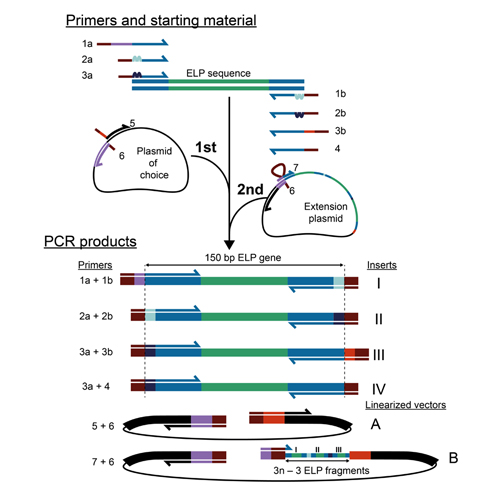Sequence-Independent Cloning and Post-Translational Modification of Repetitive Protein Polymers through Sortase and Sfp-Mediated Enzymatic Ligation
14-Mar-2016
Biomacromolecules, 17 (4), pp 1330–1338, DOI: 10.1021/acs.biomac.5b01726
Biomacromolecules, online article
Repetitive protein-based polymers are important for many applications in biotechnology and biomaterials development. Here we describe the sequential additive ligation of highly repetitive DNA sequences, their assembly into genes encoding protein–polymers with precisely tunable lengths and compositions, and their end-specific post-translational modification with organic dyes and fluorescent protein domains. Our new Golden Gate-based cloning approach relies on incorporation of only type IIS BsaI restriction enzyme recognition sites using PCR, which allowed us to install ybbR-peptide tags, Sortase c-tags, and cysteine residues onto either end of the repetitive gene polymers without leaving residual cloning scars. The assembled genes were expressed in Escherichia coli and purified using inverse transition cycling (ITC). Characterization by cloud point spectrophotometry, and denaturing polyacrylamide gel electrophoresis with fluorescence detection confirmed successful phosphopantetheinyl transferase (Sfp)-mediated post-translational N-terminal labeling of the protein–polymers with a coenzyme A-647 dye (CoA-647) and simultaneous sortase-mediated C-terminal labeling with a GFP domain containing an N-terminal GG-motif in a one-pot reaction. In a further demonstration, we installed an N-terminal cysteine residue into an elastin-like polypeptide (ELP) that was subsequently conjugated to a single chain poly(ethylene glycol)-maleimide (PEG-maleimide) synthetic polymer, noticeably shifting the ELP cloud point. The ability to straightforwardly assemble repetitive DNA sequences encoding ELPs of precisely tunable length and to post-translationally modify them specifically at the N- and C- termini provides a versatile platform for the design and production of multifunctional smart protein–polymeric materials.











